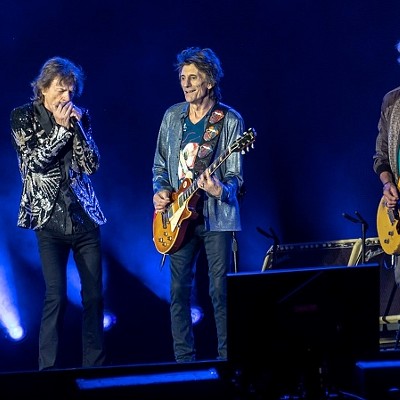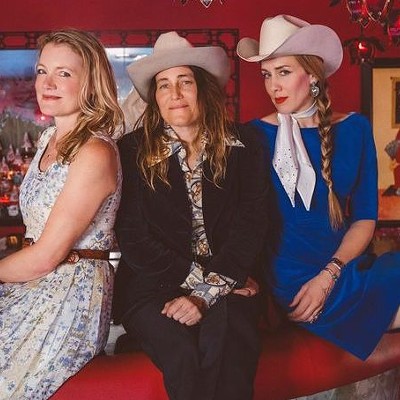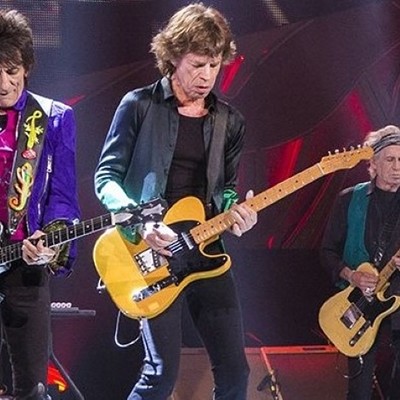Women are the resilient backbone of punk, providing creative DNA for the movement since the "zero hour," including Houston's own MyDolls and members of AK-47 and Bevatron, among others. Up 'n' comers like Vivian Pikkles keep the faith as Zipperneck and Kimonos plow through the years as well.
This list does not highlight the "best," but draws attention to these women both as icons and underdogs, the famous and the fervent. Penelope Houston, The Avengers: Sure, Chrissie Hynde of the Pretenders chummed with the Sex Pistols in England, but the Avengers played with them on their ill-fated last concert in the ruckus of San Francisco in 1978. They never landed the big record deal, but they did land in the history books. Houston's choppy blonde mop, scissory voice, abundant socio-political tirades, and fierce intelligence place her deep in the pack. Listen to "We Are the One" and "The American In Me."
Alice Armandariz, The Bags: If you think hardcore punk was paved by bands like the Bad Brains, then switch gears for a moment and listen to the blitzkrieg of "We Will Bury You" and "Survive," with its classic finger-snappin' build-up to blast-off beats. Explosive and androgynous, Alice (Bag) defined the "terrible beauty" of punk women who struggled at home, at the workplace, in the neighborhoods, and the punk clubs. She was the voice of refusal and resistance. Undeterred even today, her blog Diary of a Bad Housewife features dozens of interviews with the women from punk's history.
Siouxsie Sioux/Susan Janet Ballion (Siouxsie and the Banshees): Anyone even slightly alternative can hum one song by this provocative outfit that never fit any essay categories. They mutated from blistering, unflinching art-punk to eerie darkwave sensibilities, then switched again and delivered dance-pop with shimmering perfection.
Her emotive voice is hard to shake off, her drummer and future husband supplied the supple percussive backbeats, and the band's guitar work, willowy and sly, lingers today even in the bombast of the Killers. Try something mid-period, like the atmospheric "Arabian Nights" or biting "Halloween."
Poly Styrene (Marianne Joan Elliott-Said), X Ray Spex: Best known for their brand of saxophone-doused punk that mixed brute musical naivety with trenchant wit and street savvy feminism. Styrene, whose voice Greil Marcus compared to a toilet disinfectant, notoriously spooked Johnny Rotten with her hallucinations; meanwhile, her tumbling, harrowing vocals on "The Day the World Turned Dayglo" and "Identity" are like university lectures on deconstruction ("My mind is like a plastic bag!"). Styrene used her voice as a weapon, fragmenting the world of supermarket pop. She truly was the "Warrior in Woolworths."
Lisa Kekaula (The Bellrays): Adored more in Europe than America, it seems, Kekaula's tough-as-nails, rootsy, and brazen delivery inject whiplash soul into punk's vitriol. Black women have always been veterans of the genre, including members of the Controllers, Mutley Chix, Tribe 8, and Fire Party - but Kekaula gained more notoriety, even appeared on tracks by house music icons Basement Jaxx and electronic kingpins The Crystal Method. The Bellray's mostly no-frills recording, do-It-yourself merits, and revved-up polemics remain persistent and personalized; meanwhile, their rough'n'tumble tunes offer a welcome antidote to corporate rockism. Listen to the MC5-ish "One Big Party" and funk-punk platter "Tell the Lie."
Sleater-Kinney: Even if you deplore the band, they forged an irascible, deft style, creating a singular musical trajectory that made a whole generation of writers swoon, along with audiences. Their late-period work The Woods retained plenty of potency and unbridled diversity. Yes, Bikini Kill produced frenetic and fecund Riot Grrrl templates, but this trio, spanning two decades, committed long and hard to their unconventional blend of frenzied vocals, antsy muscular drumming, curlicuing guitars, and anything-goes structure. The one, the only.
Kim Gordon, Sonic Youth: Trying to describe Kim Gordon in short form is like writing haiku about Kathy Acker. She came, she saw, she conquered. Her presence is felt deeply, widely, and profoundly. Key moments that spell out some of her otherworldy prowess is her barrage of tunes on Goo, including "Kool Thing," in which she breathlessly interacts with Chuck D. of Public Enemy. Other titular tunes include the spoken-word dreamscape of "Shadow of a Doubt," a former fave of late-night MTV, and the intense critique of commodities on "The Sprawl," all backed by the band's enigmatic un-rock.
Patti Smith: Long regarded as the high priestess poet of punk since she mingled Beatnik spiels with visionary outsider rock and roll at St. Mark's Church. Her "comeback" in the 1990s, replete with enduring insight and pointed passion backdropped by deaths of family and friends, proved she was trans-generational. Her output has remained steadfast and appealing, but Radio Ethiopia, her misunderstood opus, is the gem to measure up to. The sonorous working-class hymn "Pissing in the River," rousing "Pumping," and the lulling testimonial "Ain't It Strange" encapsulate Smith's unconventional possession of songcraft.
Wendy O. Williams, The Plasmatics: Truly ahead of the curve, gritty Williams epitomized balls-to-the-wall tactics. Like a WWF wrestler on speed, the former sex performer from Times Square bulldozed and reinforced gender stereotypes at the same times. With Williams at the helm, decked out in duct-taped nipples, mountainous mohawk, and shaving cream, she used appearances on stage and TV talk shows to smash TVs, blow up cars, and chainsaw guitars, all while singing in an unmistakable gruff sandpaper-scraped voice. Part punk-metal circus, part performance art, the band churned out abrasive fare like "Masterplan," "Hitman," and "Pig is Pig." Wendy's ferocity matched every note. In the era of milquetoast pop, she was rabid and rank, driven and dynamic.
Exene (Christine) Cervenka, X/Knitters: John Doe and Exene Cervenka were like the roughed-up punk version of Sonny and Cher, playing their sophisticated Los Angeles noir-punk with hummable melodies and easy-on-the-ear thrust. Though her voice has never been pitch-perfect, she armed it with plenty of desire, capturing the tone and timbre of punk's insurgent smartness and artful angst. After ricocheting against Doe in tunes like "Ridin' With Mary" and melding with it on pivotal tracks like "Hungry Wolf" and later tuneage like "I'm Lost," she shed that skin for young gun projects like Auntie Christ and the Original Sinners, only to return to her roots again. Her wily poetry and Latin-influenced mixed-media collages remain vital as well.
Follow Rocks Off on Facebook and on Twitter at @HPRocksOff.





